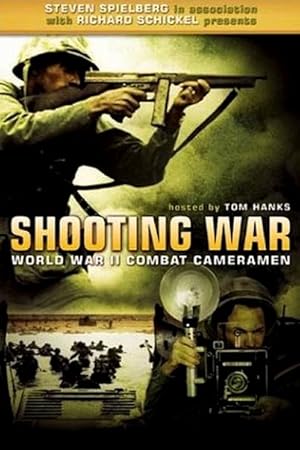
Shooting War Page #4
- Year:
- 2000
- 88 min
- 21 Views
You're so excited. You're not scared.
But you're scared after
when you come back. You're shaking.
We dropped two million tons of bombs
but never matched results promised
by air-power advocates.
This war would be won on the ground,
he made the Tarawa landing in 1943.
I was riding with Jim Crowe,
a battalion commander.
He wasn't happy having me there.
As he told me, he didn't want
any Hollywood marines.
I had to testify that I was
a regular marine, a shot expert,
that I could do something with a rifle.
He said, "All right,
but don't get in my way."
shooting what was going on.
He observed that his amtracs,
were not maintaining their course.
There was a.50 calibre buried
in the sand, shooting at them
and they kept edging over to the right.
Crowe could see his front disappearing
because of this.
He told the coxswain to put the boat in.
We ran up on the reef,
the ramp wouldn't go down,
so we had to go up over the side,
which was difficult with so much gear.
We were exhausted
because you can't walk through water
without having a lot of resistance.
And loaded down with gear,
it just drained you.
It took us a couple of minutes
on the beach to get oriented.
Hatch was pinned down
with the invaders.
There was nothing to do but shoot:
Combat footage
with a previously unknown ferocity.
The Japanese emplacements
were fantastic.
They'd built a concrete bunker
and covered it with sand and logs,
and covered that with sand.
They were pretty impregnable.
The Pacific war
favoured the cameramen.
Spaces were confined,
the action within them tightly focused.
The brutal reality of war revealed itself
here as it rarely did elsewhere.
Hatch caught the marines and their
enemy in combat in the same shot.
That was luck. Somebody said,
"Here they come."
and I just kept on shooting.
Had the Japanese mounted
a coordinated counter-attack,
they might have driven the marines
back into the sea.
But the fighting remained
as Hatch's film showed it:
Ferocious, yet disorganised.
Most of the Japanese
fought to the death.
The marines took only 17 prisoners.
The seas continued
to run against reinforcements.
Among them was
another cameraman, John Ercole.
We didn't even know
what was going on.
We were going nowhere. The propeller
and the tide didn't come together.
I was shooting whatever I could,
people in my boat and things like that.
19 hours later,
we finally made a landing.
was mostly the dead and wounded.
Their evacuation was poorly handled.
Translation
Translate and read this script in other languages:
Select another language:
- - Select -
- 简体中文 (Chinese - Simplified)
- 繁體中文 (Chinese - Traditional)
- Español (Spanish)
- Esperanto (Esperanto)
- 日本語 (Japanese)
- Português (Portuguese)
- Deutsch (German)
- العربية (Arabic)
- Français (French)
- Русский (Russian)
- ಕನ್ನಡ (Kannada)
- 한국어 (Korean)
- עברית (Hebrew)
- Gaeilge (Irish)
- Українська (Ukrainian)
- اردو (Urdu)
- Magyar (Hungarian)
- मानक हिन्दी (Hindi)
- Indonesia (Indonesian)
- Italiano (Italian)
- தமிழ் (Tamil)
- Türkçe (Turkish)
- తెలుగు (Telugu)
- ภาษาไทย (Thai)
- Tiếng Việt (Vietnamese)
- Čeština (Czech)
- Polski (Polish)
- Bahasa Indonesia (Indonesian)
- Românește (Romanian)
- Nederlands (Dutch)
- Ελληνικά (Greek)
- Latinum (Latin)
- Svenska (Swedish)
- Dansk (Danish)
- Suomi (Finnish)
- فارسی (Persian)
- ייִדיש (Yiddish)
- հայերեն (Armenian)
- Norsk (Norwegian)
- English (English)
Citation
Use the citation below to add this screenplay to your bibliography:
Style:MLAChicagoAPA
"Shooting War" Scripts.com. STANDS4 LLC, 2024. Web. 10 May 2024. <https://www.scripts.com/script/shooting_war_18036>.


Discuss this script with the community:
Report Comment
We're doing our best to make sure our content is useful, accurate and safe.
If by any chance you spot an inappropriate comment while navigating through our website please use this form to let us know, and we'll take care of it shortly.
Attachment
You need to be logged in to favorite.
Log In